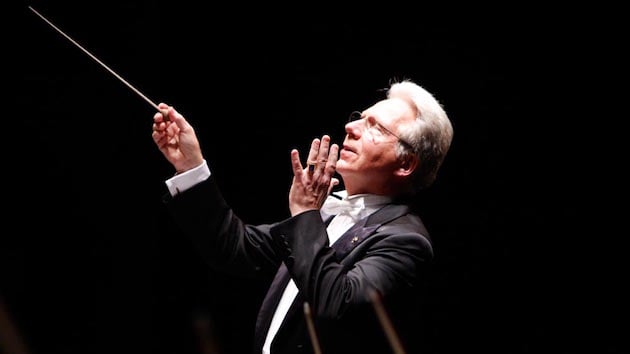
John Mauceri has been a busy Renaissance man of the podium ever since the early 1970s when he became Leonard Bernstein’s go-to guy for conducting and making new editions of his music. We have Mauceri to thank for making Candide a viable fixture on international stages through editions culminating with the Scottish Opera version that Bernstein eventually recorded in 1989. He also came up with the idea of folding Trouble in Tahiti within its sequel A Quiet Place as a flashback, which went a long way toward making the latter work stageworthy.
Since his mentor, colleague, and friend’s death in 1990, Mauceri has continued to develop a multifaceted identity — captaining the Hollywood Bowl Orchestra that had been created for him for 16 summers; playing a big part in Decca’s indispensable Entartete Musik project that revived many works from composers persecuted by the Nazis; conducting operas, symphonic music, Broadway musicals, film music, and many world premieres. And at 72, he has been working on three books — the first of which, Maestros And Their Music, a page-turning look inside the profession loaded with juicy anecdotes, was just published by Alfred A. Knopf last week. (The second is on the effect of the three 20th-century global wars — World War I, World War II, and the Cold War — on classical music, and the third is on the central repertory of classical music — why it matters, what it means).
But Bernstein still casts a deep spell on his one-time protégé. Commemorating the maestro’s centennial, Mauceri conducted concerts with the New West Symphony containing excerpts from almost all of Bernstein’s theater works at the Valley Performing Arts Center in Northridge (part of VPAC’s Bernstein at 100 package), the Thousand Oaks Civic Arts Plaze, and the Oxnard Performing Arts Center.
Prior to a talk he was giving on his friendship with Bernstein at the Skirball Center in Bel-Air, Mauceri sat down with me for a chat on all matters Lenny and what he has been doing lately.
Does the world view Leonard Bernstein differently now than when he was still around?
I think so. I think some of it is that he’s less controversial because he is no longer with us. He had a capacity to really annoy people. He was something of a show-off and he liked attention — he liked to be the center of attention. That kind of personality tends to make certain other people suspicious — someone that gregarious, that open, that in-your-face. And I also think he somehow enjoyed being provocative. There was some part of him that just went and decided to, you know, drop a bomb into the room and say something and people would react and go, oh my goodness. Kind of a little bit like Groucho Marx characters, he was always the one saying those smart-ass kinds of things. So I think the fact that he’s no longer in the room doing that, the attitude toward him can be more settled.

Also, because he is no longer with us, there is a larger view of what his life was. All the way through those 18 years [that I worked for him], we would always read article about what Leonard Bernstein should be doing. He should be practicing the piano more, he should be writing more, he should be conducting more Mozart. Everybody had an opinion. And part of that was because Lenny was so open that he almost invited opinions. But as a public person, people always have opinions. Once he died, people could then start assessing the totality of his life and not keep suggesting that he should have done this or done that.
The bottom line is that he was always doing the same thing. It’s all part of one package — teaching, educating, believing that music could change the world for the better, and that the world should be a better place, standing up for peoples’ rights, and enjoying living. I don’t know anybody who enjoyed living more than Lenny.
You must have had a lot of fun with him.
When I think about that, there were astonishing times. We laughed. We laughed more than anything. He was the best joke-teller I ever met. He was unbelievably funny and witty, kind of a rueful Jewish sense of humor, part of a great tradition of Jewish America, and not just America. And because he was so smart, he was a great patter matcher so he could make jokes. I think he liked me because I come from a very funny family, a Sicilian kind of humor, so my Sicilian-American humor and his Jewish-American humor was a concatenation of laughs. I think one of the proudest moments of my life was making him laugh.
What do you think Lenny would have thought about today’s political situation?
Well, he would be very active. I have said to his children, we really do need more of 1600 Pennsylvania Avenue because there is so much in that that is appropriate for now. After all, that was written in the post-Vietnam War-Watergate period and I think that right now, Lenny and I would be working on a version of that for sure.
Are there any plans to revive 1600 Pennsylvania Avenue?
Right now, no. The family, the children, they don’t want it yet. I think it’s too painful. They lived with their father going through this terrible time in his life — their mother died, Lenny wrote his first musical since West Side Story and it was a dismal failure. And it shouldn’t have been — you know, it has so much great music in it. In the concerts we’re doing this weekend, there will be three pieces from 1600.
Lenny, on the Thursday night before he died, asked me “to do for 1600 what I had done for Candide,” and I take that as a life request from this great man in my life. But I cannot do that without the family agreeing to that because they’re so involved with that personal time. It was a traumatic time for them and I respect that. But I think sometime, after the centenary is over, we will be able to address that again.
One fascinating insight I got out of your book is that careers are not on a constantly upward, linear trajectory as program bios seem to indicate.
I think we humans have this delightful need to make logic out of everything, but it isn’t logical. You can make categories, you can see an overriding arc. We create art that gives structure to what is basically incomprehensible in our lives. I could never predict where I am right now, I could never have.

I’m at a time in my life where there are more surprises every day. I’m writing three books. At the same time, I’ve got a big project with Disney, another book that may be turned into a stop-action motion picture. And I’m conducting all over the world. I’m not, however, conducting the central repertory right now; I’m spending a lot of time with Danny Elfman and other living composers of film music, which is a logical extension of what I was doing at the Bowl. It makes a lot of sense since I had brought film music to the Bowl in 1991 and ’92. Every piece of music we played, with few exceptions, we had to restore from manuscripts because it was never published. It was not played much at all, anywhere in the world. Look at it now, 25 years later. There isn’t an orchestra in the world that gets through the season without doing two or three of them. I don’t do much of that anymore because it’s done, which is fine.”
Do you feel that your own career was held back at times due to your willingness to stretch out into the area of Broadway musicals, film music, and other popular music forms?
It’s possible. It’s hard to know. When I’m feeling sad that I’m not conducting some repertory that I had been conducting with great success and I wonder why, you look for reasons. One of them is to blame somebody or something else.
I think there is tremendous snobbery in the classical-music world, and one tends to be pigeon-holed. It’s very hard to pigeonhole me because if you look at my career over 50 years, and you say, what did he do, people don’t remember that I conducted three hugely successful productions of Alban Berg’s Lulu. The times I did San Francisco Opera, I conducted five productions. All of them were 20th-century operas. I started with the West Coast premiere of Britten’s Death in Venice (1975), then the world premiere of Andrew Imbrie’s Angle of Repose, (1976), and then I did Stravinsky’s The Rake’s Progress (1988), Lulu (1989), and Britten’s A Midsummer Night’s Dream (1992).
In London, I only conducted Verdi and Puccini at the Royal Opera House and at English National Opera. So from London’s point of view, that’s what they thought of me. Four million people came to my concerts at the Bowl, and if you didn’t come to those concerts, you might think of them as “pops” concerts. But we played Ligeti’s Atmospheres — first time it was played at the Bowl. We played everybody’s music, and we brought back opera and ballet, and we did first-time staged musicals.

Here’s the good news about that. It always forced me to survive, and to look for other things to do. As a former manager once said to me; “John you had that, you did that.” Now that’s actually pretty smart. Yes, I did conduct Turandot at La Scala. You know, that should be enough in anybody’s life, right? I did conduct Fidelio at the Metropolitan Opera; that’s pretty good, too, right? I did conduct the premiere of Bernstein’s A Quiet Place, also at La Scala, and the European premiere of [Bernstein’s] Mass in Vienna.
I have nothing to complain about. There are times when I long to be at the center of the wheel, that central place, and I don’t have an opportunity to do that. On the other hand, I bring that center to everything that I do.
How does a conductor stay in physically good enough shape in order to wave the stick for hours?

One of the healthiest aspects in what is an insane job is that our challenges are finite and they go for a week or two weeks — or in the case of an opera, they may go for a month or so — and then it’s over. They’re not carrying the same stresses. It’s a different place, it’s a different orchestra, it’s different food. So you’re constantly having that happen, and I think that [change] is probably quite healthy.
People who have stressful jobs that are as stressful as being a conductor, those stresses tend to be the same stresses every day — you know, the person who is in the office with you all the time, you don’t get away from that. In the past six weeks, I have conducted in Prague, Vienna, Hamburg, Paris, Mexico City, and now I’m here in Los Angeles — different places, different hotels, and different time zones. That definitely keeps you active and keeps your brain really active. And physically active, because you’re moving.
Any special diets that you observe before and after performances?
Arthur Fiedler once said when they asked him that, “Well, I sleep when I’m tired and I eat when I’m hungry.” That’s one of the funnier direct lines because Arthur was something of a grump!


